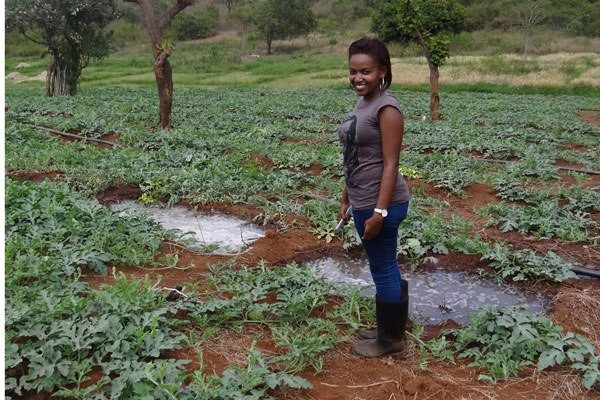After graduating from Egerton University in 2007 with a degree in biomedical science, Annie Nyaga expected to land a job soon after and scale the ladder in her career.
She got a job as a purchasing assistant at a firm in Nairobi, but quit after six months because it was boring.
She turned to farming, which was what her parents had been doing for years at their home in Mbeere, Embu County.
It has been six years since Annie, 28, went into watermelon farming, a business that has brought her great joy.
“I settled for watermelons because they do very well in Mbeere. They are high-yielding, mature faster and do well in the market,” says Annie who farms under the trade name Farm2Home.
She started growing the fruit on her parents’ three-acre farm with a capital outlay of Sh20,000.
IRRIGATION SYSTEM
She used the money to buy seeds, but soon realised that she needed more to invest in a proper drip irrigation system.
“I did trial runs with seeds from different companies before I discovered that hybrid seeds produce the highest yield.”
She plants the seeds in a nursery before transferring the seedlings to the farm after three weeks.
“The whole process, from nursery to harvest, takes about three months depending on the climate and the variety of watermelons as some mature early,” she says.
According to her, watermelons require a lot of water especially at fruit-formation stage.
The farmer has invested in a drip irrigation system that includes water pumps, hand spraying guns and pipes. She bought the equipment from the profit she made on her first harvest.

COST OF SEEDS
“Lack of adequate water leads to low-quality fruit. If one has water problems, then drip irrigation is the best alternative,” she says
However, installing a proper drip system is costly, particularly for small-scale-farmers.
“A drip system costs Sh200,000 per acre. This may not be affordable to many farmers,” she says.
The option for small-scale farmers is to partially irrigate the crop and plan for the fruit-formation stage to coincide with the rainy season.
“This means you plant seeds two to three weeks before the start of rains,” Annie says with a smile.
Watermelons, she says, yield high returns. She invests between Sh80,000 and Sh100,000 per acre. This covers cost of seeds, labour, chemicals, irrigation, salaries and fertiliser.
With good management, one can harvest 30 to 40 tonnes per acre.
Prices vary according to market forces. This poses a huge challenge to farmers, who find themselves at the mercy of middlemen.
Depending on the season, a kilo of watermelon goes for between Sh15 and Sh35.
“Middlemen usually take advantage of desperate farmers, especially those who get high yields but find no market. Lack of ideal market linkages for farmers means brokers dictate farm prices,” she says
But this does not stop her from dealing with brokers, who buy most of harvest. The trick, she says, lies in knowing the market price.
Her last harvest was two weeks ago. She harvested 30 tonnes and sold to brokers at Sh28 per kilo, making gross sales of Sh840,000 in three months. If you take away expenses, Annie raked in a profit of at least Sh600,000. Her next harvest is in July.
“I do not know how I would be fairing now if I had stuck to my purchasing job. Going into farming was a good decision,” she notes.
Annie wants Kenyans to change their attitude towards farming. To many, she says, a farmer is an old and uneducated person.
“This mental picture has to change. Agriculture is diverse and interesting and young people ought to view it differently if we are to develop.”
She challenges the government and counties to invest heavily in agriculture to make it a viable option for income generation. Students should be encouraged to see agriculture as a career from a tender age.
“I am a living proof that farming pays and can be done by anyone. Farming is a profession of hope. To those interested in farming never ever give up,” she concludes.
Source: http://bizna.co.ke/annie-nyaga-i-quit-my-job-to-farm-watermelons-now-im-making-millions/


Leave a Reply